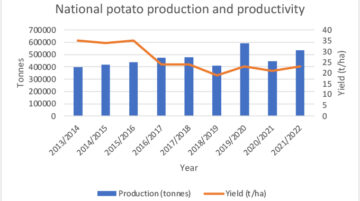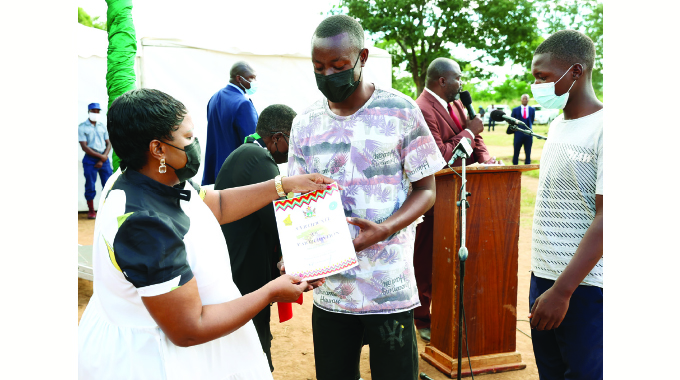Potato Value Chain Financing influences 19 pct growth

Edgar Vhera Agriculture Specialist Writer
THE Government’s intervention in the potato industry through the Potato Value Chain Financing Facility (PVCFF) is beginning to bear fruit with farmers recording a 19 percent surge in production levels following the facility’s introduction last year.
The Agricultural and Rural Development Advisory Services (ARDAS) head of seed services, Mr Edmore Mtetwa revealed this in his potato production trend executive summary report yesterday.
“In an effort to increase potato production, the Government initiated the PVCFF last year to assist farmers access loans for procuring seed, fertilisers and agro-chemicals – the major cost drivers in potato production.
“The noticeable immediate impact was a 19 percent increase in national potato production with 32 percent of that surge attributed to the PVCFF,” said Mr Mtetwa.

Potato production trend: Ministry of Agriculture second round crop and livestock assessment
The major driving factor for the increase in national potato production from 447 867 tonnes in 2021 to 534 543 tonnes in 2022 was the launch of the TVCFF last year.
The 1 200ha financed under the PVCFF contributed about 27 600 tonnes of potato at the national average yield of 23 tonnes per hectare thereby contributing 32 percent of the change.
Mr Mtetwa cited the following Government interventions as the chief drivers of the increased production over the years: a. the ban on table potato imports since 2010 b. registration of new seed houses and new potato varieties c. the formation of the Zimbabwe Seed Potato Companies Association (ZSPCA) and TVCFF, which is being administered by AFC Holdings.
AFC Holdings Group Head – Strategy, Marketing and Corporate Communications Ms Caroline Mozhendi revealed that the bank contracted and financed potato production on 1 200ha.
“Loans in excess of $1, 5 billion have been approved and disbursed to 14 individual potato projects, with the majority in Mashonaland East province, which accounts for 900ha of financed crop.
“Financing is still available and farmers are encouraged to apply as the Land Bank is targeting to increase funding to $3 billion this year,” said Ms Mozhendi.
The Government declared potato a national strategic food security crop in 2012. This major policy pronouncement, qualified the potato sub-sector for Government-initiated farmer support services such as mechanisation and irrigation capacity building.
Even though the sub-sector enjoyed Government policy support, high potato production costs, low yields and lack of farmer training impacted negatively on the value chain performance.
It was in view of the above challenges that the Government launched the TVCFF last year with the aim of transforming the potato value chain through increased coordination among all value chain players and availing of production loans at farmer-friendly interest rates.
At the launch of the PVCFF last year at Mr Ronald Museka’s Parklands Farm, Lands, Agriculture, Fisheries, Water and Rural Development permanent secretary Dr John Basera said AFC Holdings had financed 554 hectares of potato ventures valued at $699 million while projects in the pipeline were targeting 705ha.
In order to enhance full recovery of any support given by the bank on the cost of inputs, the facility is anchored on tripartite arrangements involving the bank, farmers and the off-takers.
Evidence of increased potato production is being demonstrated through the ready availability of the product on the market, as corroborated by Knowledge Transfer Africa chief executive officer Dr Charles Dhehwa who confirmed that over 500 tonnes of potatoes were being traded on the Mbare market daily.
“Potato is among the agriculture products that have been lavishly supplied on the market for the past two months due to increased production.
“Consumers are the main beneficiaries, as prices have gone down from US$7 to US$5, 50 for a 15-kilogramme pocket of large potatoes,” said Dr Dhehwa.










Comments